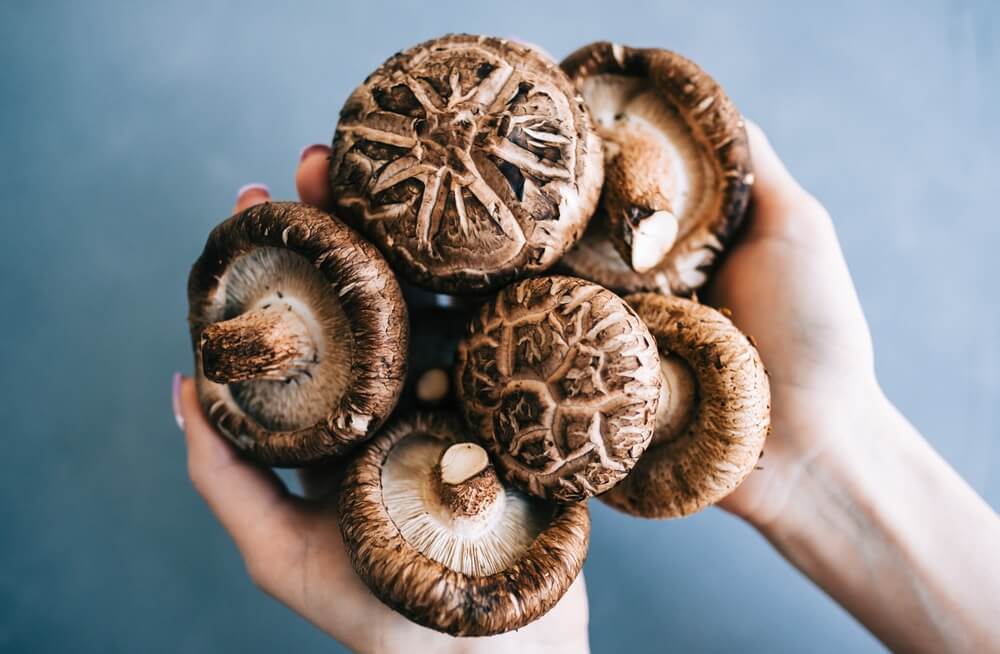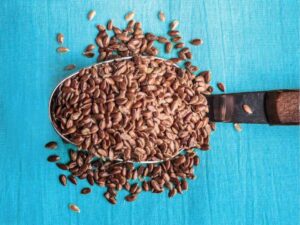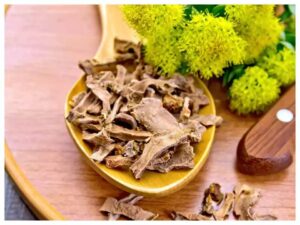The Mystical Origin Story of Shiitake Mushrooms
The Humble Beginnings
Shiitake mushrooms, also known as Lentinula edodes, have a rich and mystical origin story. They have been used in traditional Chinese medicine for centuries and are believed to have originated in the mountains of East Asia, specifically in China and Japan.
A Fortuitous Discovery
According to legend, shiitake mushrooms were discovered in China during the Han Dynasty (206 BC – 220 AD). The story goes that a man named Wu San Kwung, who was out hunting in the forest, stumbled upon a dead log that had been overtaken by a group of mushrooms. Being curious, he took some of the mushrooms back to his village to share with his fellow villagers. They found that the mushrooms were not only edible but also had a delightful taste and aroma. This fortuitous discovery quickly spread, and shiitake mushrooms became a popular delicacy throughout the region.
A Revered and Mystical Food
Shiitake mushrooms quickly became revered in Chinese culture and were often reserved for the emperor and other high-ranking officials. They were believed to have mystical properties and were associated with longevity, health, and vitality. In traditional Chinese medicine, shiitake mushrooms were used to boost the immune system, treat respiratory ailments, and promote overall health and well-being.
The Spread of Shiitake Mushrooms
The popularity of shiitake mushrooms quickly spread beyond China and into neighboring Japan. In Japan, shiitake mushrooms were not only a popular food but also used in religious ceremonies and believed to have mystical powers. They were also used in traditional Japanese medicine to treat a wide range of health issues.
Shiitake Mushrooms Today
Today, shiitake mushrooms are still highly valued for their taste and health benefits. They are a popular ingredient in many cuisines around the world and are used in a variety of dishes, including soups, stir-fries, and sushi. They are also widely available as supplements, and research has shown that they have potential health benefits, including boosting the immune system and reducing inflammation.
Conclusion
The story of how shiitake mushrooms were first discovered is a fascinating one, steeped in myth and legend. Whether or not the story of Wu San Kwung is entirely accurate is impossible to know for sure, but what is clear is that shiitake mushrooms have been a revered and mystical food for centuries. Today, shiitake mushrooms are still celebrated for their taste and health benefits and are a testament to the enduring power of traditional food and medicine.

Exploring the Health Benefits of Shiitake Mushrooms
Immune System Support
One of the most significant health benefits of shiitake mushrooms is their ability to support the immune system. Shiitake mushrooms contain a polysaccharide called beta-glucan, which has been shown to stimulate the immune system and enhance the body’s ability to fight off infections and diseases. Research has also shown that beta-glucans can activate immune cells called natural killer cells, which play a crucial role in fighting cancer and other diseases.
Cardiovascular Health
Shiitake mushrooms are also beneficial for cardiovascular health. They contain a compound called eritadenine, which has been shown to reduce cholesterol levels and improve blood flow. Studies have also shown that shiitake mushrooms can improve endothelial function, which is the ability of blood vessels to dilate and constrict. Endothelial dysfunction is a risk factor for cardiovascular disease, so improving endothelial function can help reduce the risk of heart disease.
Anti-Cancer Properties
Shiitake mushrooms are believed to have anti-cancer properties. Research has shown that they contain a compound called lentinan, which has been shown to inhibit the growth of cancer cells and induce apoptosis, or cell death, in cancer cells. Lentinan has also been shown to enhance the immune system’s ability to fight off cancer cells. Other compounds found in shiitake mushrooms, such as ergothioneine and selenium, have also been shown to have anti-cancer properties.
Anti-Inflammatory Properties
Shiitake mushrooms have anti-inflammatory properties, which can help reduce inflammation throughout the body. Inflammation is a contributing factor to many chronic diseases, including heart disease, cancer, and diabetes. Studies have shown that shiitake mushrooms can reduce inflammation in the body by inhibiting the production of inflammatory cytokines.
Nutritional Profile
In addition to their various health benefits, shiitake mushrooms are also a nutritious food. They are an excellent source of B vitamins, including thiamine, riboflavin, and niacin, as well as minerals such as copper, zinc, and selenium. They also contain a variety of other beneficial compounds, including beta-glucans, lentinan, and ergothioneine.
How to Incorporate Shiitake Mushrooms into Your Diet
Shiitake mushrooms can be incorporated into a healthy diet in a variety of ways. They can be sautéed or grilled and used in stir-fries, soups, and other dishes. They can also be used to make mushroom broth or added to risottos and pasta dishes. In addition, shiitake mushrooms are available as a supplement in capsule or powder form, which can be added to smoothies or taken as a supplement.
Conclusion
Shiitake mushrooms are a versatile and nutritious food that offers a variety of health benefits. They can support the immune system, improve cardiovascular health, have anti-cancer and anti-inflammatory properties, and provide a range of essential nutrients. Incorporating shiitake mushrooms into a healthy diet can be an excellent way to support overall health and well-being.

Nutritional Components and Core Ingredients of Shiitake Mushrooms
Macronutrients
Shiitake mushrooms are a low-calorie food and are a good source of protein and fiber. A 100-gram serving of shiitake mushrooms contains around 34 calories, 2.2 grams of protein, and 2.5 grams of fiber. While shiitake mushrooms are not a significant source of carbohydrates, they do contain a small amount of sugar.
Vitamins
Shiitake mushrooms are an excellent source of several B vitamins, including thiamine (B1), riboflavin (B2), niacin (B3), and pantothenic acid (B5). These vitamins play a crucial role in energy metabolism, nervous system function, and the production of red blood cells. Shiitake mushrooms are also a good source of vitamin D, which is essential for bone health and immune function.
Minerals
Shiitake mushrooms are a rich source of several essential minerals, including copper, zinc, and selenium. Copper is essential for the production of red blood cells, while zinc is important for immune function and wound healing. Selenium is a powerful antioxidant that helps protect cells from damage and supports thyroid function.
Polysaccharides
One of the most significant health benefits of shiitake mushrooms comes from their polysaccharide content, specifically a type of polysaccharide called beta-glucan. Beta-glucans have been shown to stimulate the immune system and enhance the body’s ability to fight off infections and diseases. They have also been shown to have anti-cancer and anti-inflammatory properties.
Lentinan
Lentinan is a polysaccharide found in shiitake mushrooms that has been shown to have anti-cancer properties. It works by stimulating the immune system to recognize and attack cancer cells. Lentinan has been used in traditional Chinese and Japanese medicine for centuries to treat cancer and other diseases.
Ergothioneine
Ergothioneine is a unique antioxidant found in shiitake mushrooms that has been shown to have a wide range of health benefits. It helps protect cells from damage caused by free radicals and has been shown to have anti-inflammatory and anti-cancer properties. Ergothioneine is also believed to play a role in preventing age-related cognitive decline.
Other Beneficial Compounds
Shiitake mushrooms contain a variety of other beneficial compounds, including small amounts of plant-based sterols and triterpenes. These compounds have been shown to have cholesterol-lowering properties and anti-inflammatory properties, respectively.
How to Incorporate Shiitake Mushrooms into Your Diet
Shiitake mushrooms can be used in a variety of dishes, including soups, stir-fries, and salads. They can also be sautéed or grilled and served as a side dish. Dried shiitake mushrooms can be rehydrated and used in soups and stews, and shiitake mushroom powder can be added to smoothies and other drinks. Shiitake mushrooms are also available as a supplement in capsule or powder form.
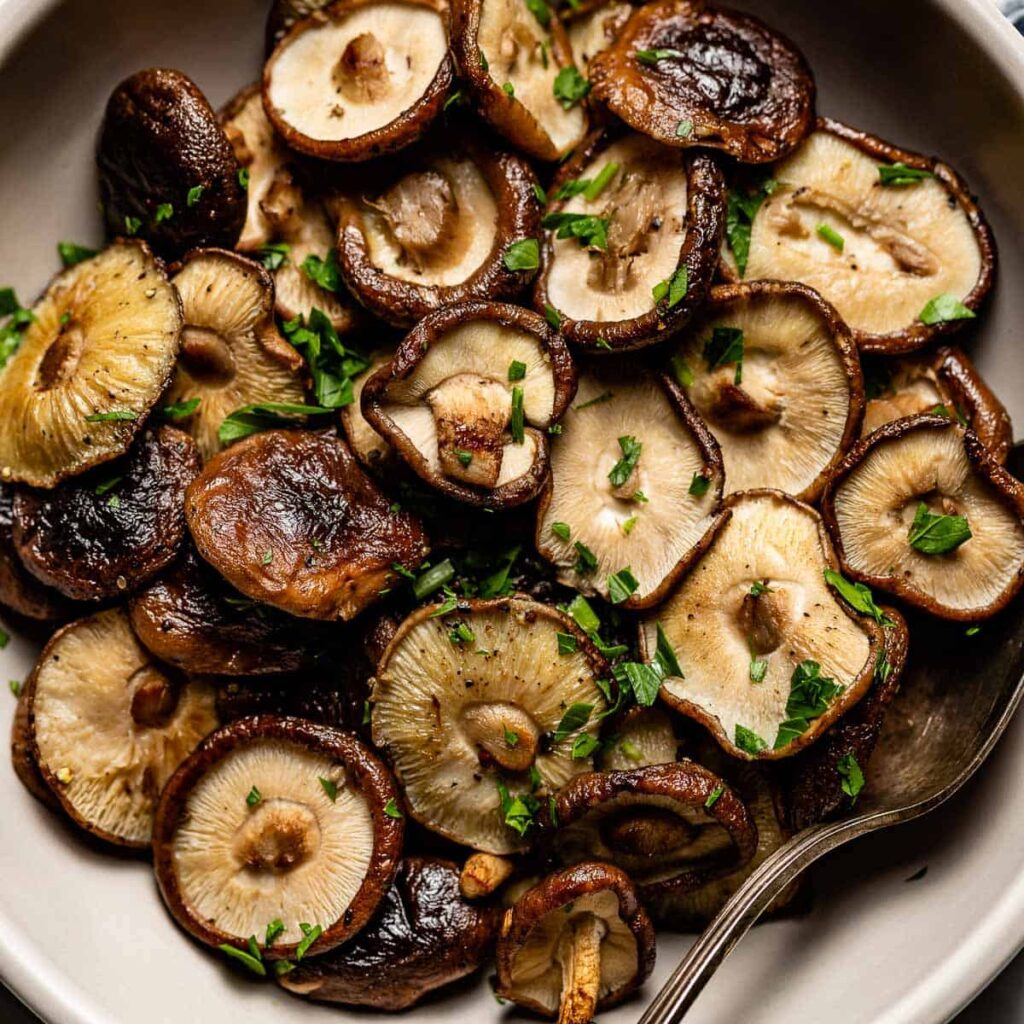
Methods for Consuming Shiitake Mushrooms
Fresh Shiitake Mushrooms
Fresh shiitake mushrooms are available in many grocery stores and farmers’ markets. They have a meaty texture and a rich, earthy flavor that pairs well with many dishes. To prepare fresh shiitake mushrooms, wash them thoroughly and trim off the stems. They can be sliced and sautéed with garlic and onions or added to soups and stews. Fresh shiitake mushrooms can also be marinated and grilled, roasted, or baked.
Dried Shiitake Mushrooms
Dried shiitake mushrooms are a convenient and versatile ingredient that can be used in many dishes. They have a more intense flavor than fresh mushrooms and can add depth and complexity to soups, stews, and sauces. To rehydrate dried shiitake mushrooms, place them in a bowl of hot water and let them soak for at least 30 minutes. Once they are fully hydrated, they can be sliced and added to dishes.
Shiitake Mushroom Powder
Shiitake mushroom powder is a concentrated source of the beneficial compounds found in shiitake mushrooms. It can be added to smoothies, soups, and sauces to provide an extra boost of nutrition and flavor. To use shiitake mushroom powder, simply mix it into your desired recipe. It can also be encapsulated and taken as a dietary supplement.
Shiitake Mushroom Tea
Shiitake mushroom tea is a popular way to consume shiitake mushrooms in traditional Chinese and Japanese medicine. To make shiitake mushroom tea, simply simmer sliced shiitake mushrooms in water for at least 30 minutes. Strain out the mushrooms and enjoy the tea hot or cold. Shiitake mushroom tea has a rich, savory flavor and is a great way to support immune function and overall health.
Shiitake Mushroom Broth
Shiitake mushroom broth is a flavorful and nutritious base for soups and stews. To make shiitake mushroom broth, simmer dried shiitake mushrooms in water with aromatics such as garlic, onions, and ginger for at least an hour. Strain out the solids and use the broth as a base for soups, stews, and sauces. Shiitake mushroom broth is an excellent source of the beneficial compounds found in shiitake mushrooms, and can provide a range of health benefits.
Shiitake Mushroom Supplements
Shiitake mushroom supplements are available in capsule or powder form and can be taken as a dietary supplement. These supplements provide a concentrated source of the beneficial compounds found in shiitake mushrooms and can support immune function, cardiovascular health, and overall well-being. To use shiitake mushroom supplements, follow the recommended dosage on the packaging.
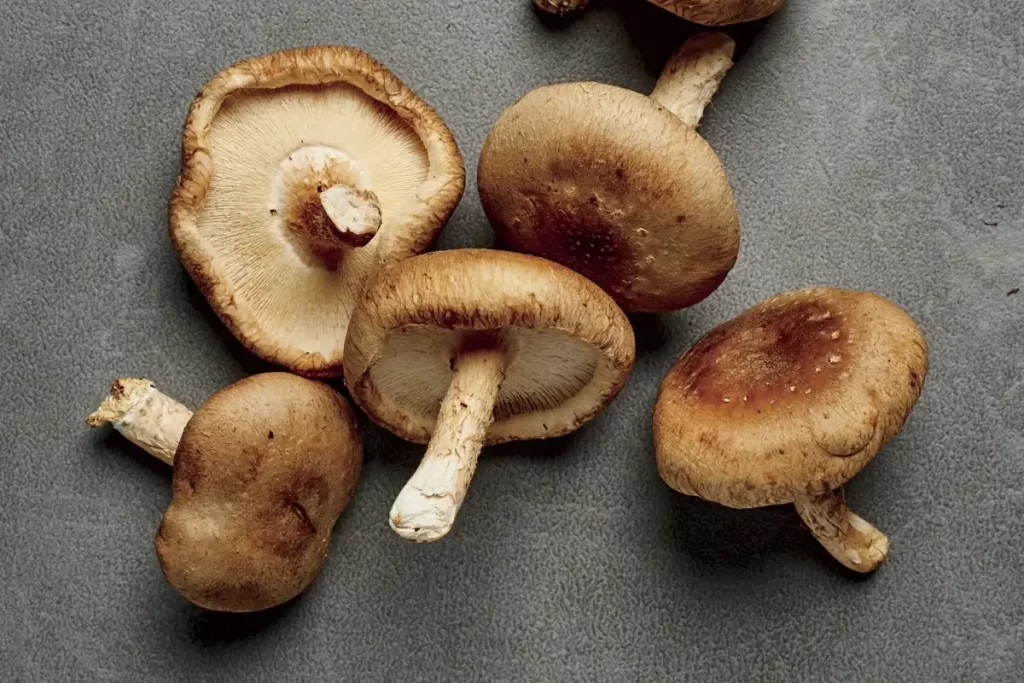
Potential Side Effects and When to Avoid Taking Shiitake Mushrooms
Shiitake mushrooms are generally safe to consume and are not associated with significant side effects. However, some individuals may experience adverse reactions to shiitake mushrooms, and there are certain situations where shiitake mushrooms should be avoided. In this article, we will explore the potential side effects of shiitake mushrooms and when to avoid taking them.
Allergic Reactions
Like any food, shiitake mushrooms can cause allergic reactions in some individuals. Symptoms of an allergic reaction may include itching, swelling, hives, or difficulty breathing. In rare cases, an allergic reaction to shiitake mushrooms can be severe and require medical attention. If you have a known allergy to mushrooms or other fungi, it is best to avoid shiitake mushrooms.
Digestive Issues
Some individuals may experience digestive issues when consuming shiitake mushrooms, particularly if they are not cooked properly. Eating raw or undercooked shiitake mushrooms can cause stomach upset, including bloating, gas, and diarrhea. To avoid these symptoms, it is best to cook shiitake mushrooms thoroughly and avoid consuming them raw.
Interactions with Medications
Shiitake mushrooms may interact with certain medications, particularly those that affect blood clotting. Shiitake mushrooms contain a compound called eritadenine, which has been shown to have anticoagulant properties. If you are taking blood-thinning medications such as warfarin, heparin, or aspirin, it is best to avoid consuming shiitake mushrooms or to consult with your healthcare provider before doing so.
Toxicity
While shiitake mushrooms are generally safe to consume, there have been reports of shiitake mushroom toxicity in some individuals. This is most commonly associated with consuming large quantities of raw or undercooked shiitake mushrooms. Symptoms of shiitake mushroom toxicity may include vomiting, diarrhea, stomach cramps, and skin rash. To avoid shiitake mushroom toxicity, it is best to cook shiitake mushrooms thoroughly before consuming them.
When to Avoid Shiitake Mushrooms
There are certain situations where it is best to avoid consuming shiitake mushrooms. These include:
- Allergies: If you have a known allergy to mushrooms or other fungi, it is best to avoid shiitake mushrooms.
- Blood clotting disorders: If you are taking blood-thinning medications or have a bleeding disorder, it is best to avoid shiitake mushrooms or to consult with your healthcare provider before consuming them.
- Autoimmune diseases: If you have an autoimmune disease such as lupus or rheumatoid arthritis, it is best to avoid shiitake mushrooms, as they may stimulate the immune system and worsen symptoms.
Conclusion
Shiitake mushrooms are generally safe to consume and are associated with a range of health benefits. However, some individuals may experience allergic reactions or digestive issues when consuming shiitake mushrooms, and there are certain situations where shiitake mushrooms should be avoided. If you have any concerns about consuming shiitake mushrooms or are experiencing any adverse reactions, it is best to consult with your healthcare provider. With proper preparation and attention to individual health concerns, shiitake mushrooms can be a safe and delicious addition to a healthy diet.
The Drug Interactions of Shiitake Mushrooms
Anticoagulants
Shiitake mushrooms contain a compound called eritadenine, which has been shown to have anticoagulant properties. This means that consuming shiitake mushrooms may increase the risk of bleeding in individuals taking anticoagulant medications such as warfarin, heparin, or aspirin. If you are taking these medications, it is best to avoid consuming shiitake mushrooms or to consult with your healthcare provider before doing so.
Immunosuppressants
Shiitake mushrooms may interact with immunosuppressant medications, which are used to prevent rejection of transplanted organs or to treat autoimmune diseases such as rheumatoid arthritis or lupus. Shiitake mushrooms contain a polysaccharide called lentinan, which has been shown to stimulate the immune system. This can counteract the effects of immunosuppressant medications and potentially worsen symptoms. If you are taking immunosuppressant medications, it is best to avoid consuming shiitake mushrooms or to consult with your healthcare provider before doing so.
Chemotherapy
Shiitake mushrooms may interact with chemotherapy medications, which are used to treat cancer. While shiitake mushrooms have been shown to have anti-cancer properties, they may also interfere with the effectiveness of chemotherapy drugs. If you are undergoing chemotherapy, it is best to avoid consuming shiitake mushrooms or to consult with your healthcare provider before doing so.
Diabetes Medications
Shiitake mushrooms may interact with diabetes medications, particularly those that lower blood sugar levels. Shiitake mushrooms contain polysaccharides that have been shown to lower blood sugar levels. If you are taking diabetes medications, it is important to monitor your blood sugar levels closely when consuming shiitake mushrooms and to consult with your healthcare provider to adjust your medication as needed.
Conclusion
Shiitake mushrooms are a nutritious and delicious food that can provide a range of health benefits. However, they may interact with certain medications, particularly anticoagulants, immunosuppressants, chemotherapy medications, and diabetes medications. If you are taking any of these medications, it is best to consult with your healthcare provider before consuming shiitake mushrooms to avoid potential interactions. With proper attention to medication interactions, shiitake mushrooms can be safely consumed as part of a healthy diet.
